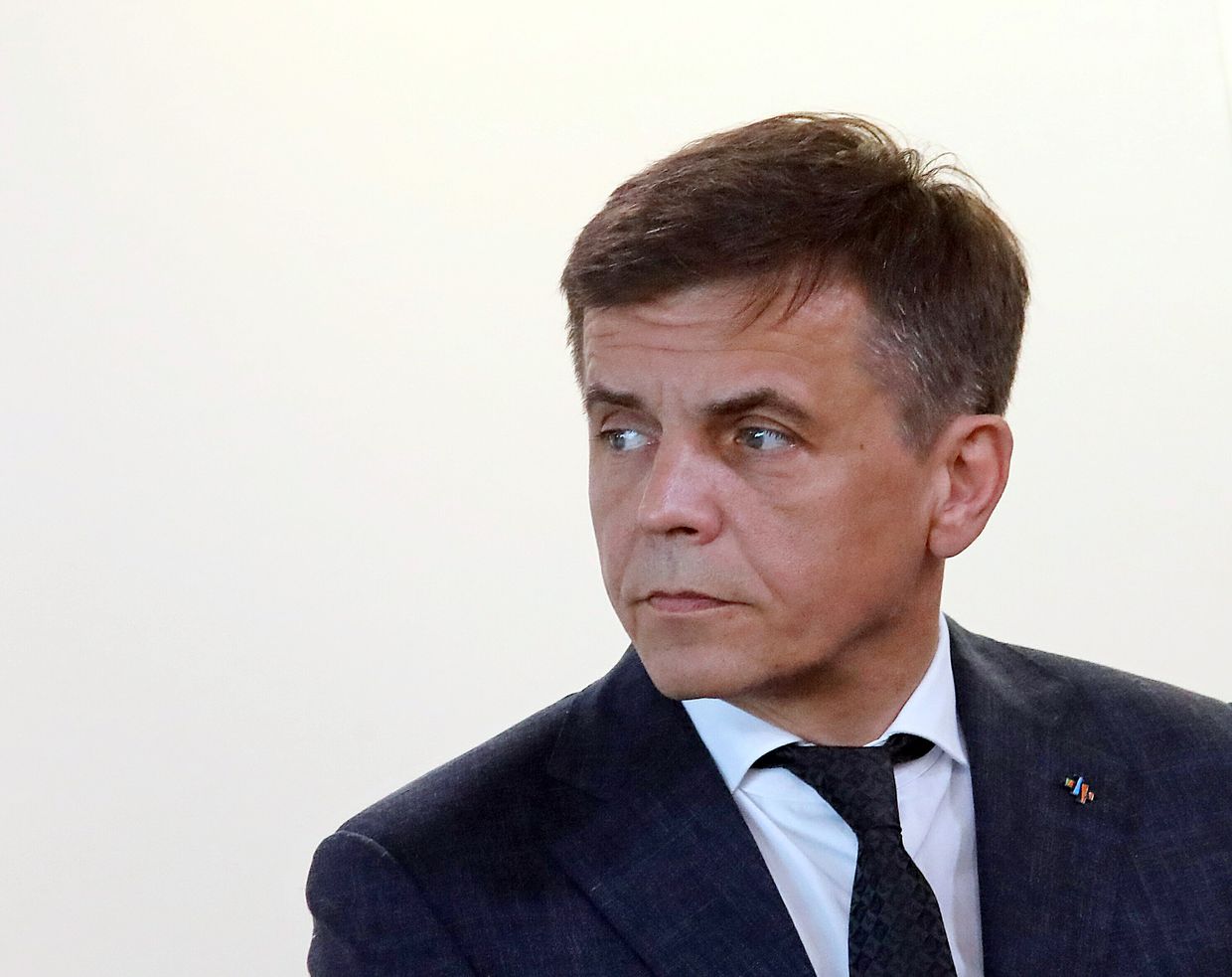Ukraine Business Roundup — Ukraine launches e-residency for foreigners
Ukraine launched an e-residency program this past week, giving some foreigners remote access to services in the country, mainly the ability to open a business and bank account and pay taxes at a favorable rate. The move is part of the country's wider digitalization efforts to counter both bureaucratic difficulties and corruption launched after President Volodymyr's election in 2019 and the creation of the Digital Transformation Ministry. Much of the inspiration for the program, called uResidency in Ukraine, comes from the success of a similar program in Estonia -- a pioneer of digital government services -- which made 64.3 million euros in tax revenue last year.
Ukraine is hoping to attract £1 million in tax revenue with 1,000 residents in the first year. It's also about showing the world Ukraine's digital transformation. "Now foreign entrepreneurs can experience firsthand the digital services that have long made Ukrainians' lives easier," Oleksandr Bornyakov, deputy minister of digital transformation on IT industry development told the Kyiv Independent. "With uResidency, we aim to share our innovative solutions with the world, enhancing the comfort and convenience of doing business for people everywhere."
To obtain e-residency status, foreigners don't need to travel to Ukraine -- which for the unfortunate reason of Russia's war is dangerous and difficult. Those eligible just have to go to their local Ukrainian consulate to verify their documents. So who can and would want to become an e-resident? So far only citizens of India, Pakistan, Thailand, and Slovenia can become e-residents in Ukraine.
The program is mostly a good fit for smaller businesses in the IT, gaming, and digital technology sectors, as well as online services in the creative economy like marketing, sales, web design, project management, marketing, and media. Why only these four countries? Slovenia for the simple reason that this country never experienced a significant influx of Ukrainian refugees as the result of Russia's war so their consular services are free to take on some extra requests, the ministry told me. Regarding India, Pakistan, and Thailand, the ministry said that according to their research, there's a strong demand for e-residency in these countries, especially as it gives them closer access to European markets.
It's also part of a broader move in Ukraine to reach Asian markets, the ministry said. What are some of the benefits of becoming an e-resident? For one, e-residents can open bank accounts from their phones, with the only in-person involvement the verification step at a consulate. At this stage, e-residency is free.
There are no hidden fees, or fees for accounting, and e-residents don't have to pay for accounting through the partner bank, the ministry said. The only costs incurred are taxes and a small fee for banking services. Speaking of taxes, e-residents will pay a tax rate of 5% on an annual income up to 180,000 euros.
If they exceed this limit, the tax increases to 15%. The program is still in its infancy, but the ministry told me that during its beta testing phase of the program with nine e-residents the feedback was overwhelmingly positive. Whether or not it's successful, I think it's worth noting here briefly that despite the full-scale invasion, despite the missiles and drones descending on Ukrainian cities and towns daily, the government is still taking steps to modernize its economy.

According to a recent study by Deloitte Ukraine and Gradus Research, 45% of 1,000 women surveyed toward the end of September said they were considering switching job fields that are traditionally considered to be male jobs.
Younger women and those who live in the western, northern regions, and Kyiv were more likely to say they were considering a change. The study also found that higher levels of women are experiencing stress and burnout, with 45% of women saying they are more stressed than last year and 38% saying they are more burnt out.
 Zhytomyr Mayor Serhii Sukhomlyn is pictured in Kyiv, Ukraine, at an unknown date. (Volodymyr Tarasov/ Ukrinform/Future Publishing via Getty Images)
Zhytomyr Mayor Serhii Sukhomlyn is pictured in Kyiv, Ukraine, at an unknown date. (Volodymyr Tarasov/ Ukrinform/Future Publishing via Getty Images)
Ukraine gets a new restoration agency head, finally
Former Zhytomyr Mayor Serhii Sukhomlyn is now head of Ukraine's Agency for the Restoration and Development of Infrastructure months after the previous head was pushed out. A bit of background: President Volodymyr Zelensky's office barred the former head of the agency, Mustafa Nayyem, from attending the Ukraine Recovery Conference in Berlin in June, prompting him to resign.
Just before, it sacked former Infrastructure Minister Oleksandr Kubrakov. Western partners were pretty confused why the President's Office would make such moves right before a conference on, well, rebuilding and restoring infrastructure and raised concerns over Ukraine's ability to protect its vital infrastructure from Russian attacks. While Kubrakov hasn't said much publicly about his firing, Nayyem cited "systemic obstacles" that limited his ability to do his job.
Which of course, makes one wonder if Sukhomlyn will have much luck in his new role. While some in the government assert reconstruction is still a priority, it doesn't feel like it from here -- in some ways understandable given the difficult battlefield situation and the urgency of making emergency repairs on energy infrastructure damaged or destroyed by Russia before it gets really cold. A glimmer of hope: As mayor of Zhytomyr, Sukhomlyn helped to get the city through winter of 2023 with almost no blackouts with good management of base-level consumption.
 Essence of Ukraine collection from the Headway app. (Headway)
Essence of Ukraine collection from the Headway app. (Headway)
Headway wants to change how you read
Book summary apps -- those that comprise collections of books condensed into short summaries you can read or listen to -- are extremely popular in our "age of distraction."
One of the most popular of those apps, in terms of downloads, is the Ukraine-based Headway app, founded in 2018 and still operating out of its Kyiv office. Since its inception, the Headway book summary app has garnered over 40 million downloads. The company itself has been featured on several lists and ratings of future unicorns in Europe.
And it all started with a lost love of reading and a divorce. Read the full profile here.
What else is happening
Ivano-Frankivsk plant sold in privatization auction for £63 million
The plant was sold as part of the government's Big Privatization drive to raise money for the budget by offloading state assets. It was bought by Ukrainian businessman Bohdan Pukish whose bid was up millions from the original starting price of around £484,000.
EBRD reduces Ukraine's GDP forecast due to Russian attacks on energy
The European Bank for Reconstruction and Development revised its growth forecast for Ukraine in 2025 from 6% to 4.7% over the impact Russia's destruction of electricity generation and transmission capacities is having on the country's economy.
Russia reportedly plans to start exporting coal from occupied Donbas in October
Donskoy Ugol Trading House's CEO, Oleg Knyazev, claimed that negotiations on coal supplies from the Donbas region are ongoing with potential buyers from China, India, Iran, Uzbekistan, and Malaysia.
Energoatom confirms detention of company official on bribery charges
The official, who leads the control and audit department, was apprehended near state nuclear energy agency Energoatom's office in Kyiv while accepting a bribe of UAH 100,000 (£2,400).
The money was demanded in exchange for resolving fuel supply issues.
Ukraine will face at least 5 hours of blackouts a day this winter, DTEK says
CEO of Ukraine's largest private energy company DTEK Maksym Tymchenko told Financial Times that an average of five hours of blackouts is in the best-case scenario where temperatures do not go below -15 Celsius and Russia does not attack energy infrastructure again, which is unlikely.
Subscribe to the Newsletter
Ukraine Business Roundup
Subscribe